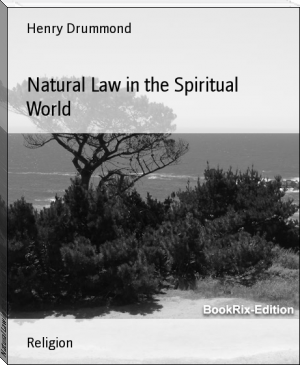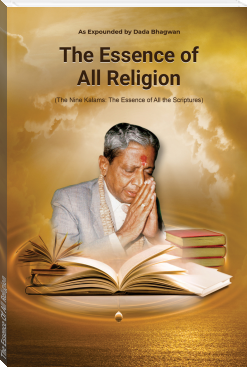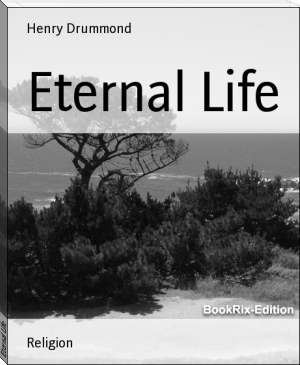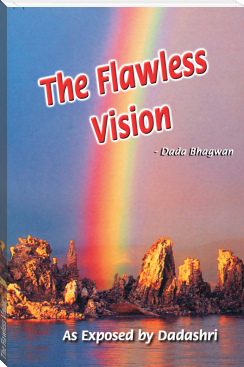Natural Law in the Spiritual World - Henry Drummond (feel good novels txt) 📗

- Author: Henry Drummond
Book online «Natural Law in the Spiritual World - Henry Drummond (feel good novels txt) 📗». Author Henry Drummond
CONTENTS.
PREFACE
INTRODUCTION
BIOGENESIS
DEGENERATION
GROWTH
DEATH
MORTIFICATION
ETERNAL LIFE
ENVIRONMENT
CONFORMITY TO TYPE
SEMI-PARASITISM
PARASITISM
CLASSIFICATION
PREFACE.
No class of works is received with more suspicion, I had almost said derision, than those which deal with Science and Religion. Science is tired of reconciliations between two things which never should have been contrasted; Religion is offended by the patronage of an ally which it professes not to need; and the critics have rightly discovered that, in most cases where Science is either pitted against Religion or fused with it, there is some fatal misconception to begin with as to the scope and province of either. But although no initial protest, probably, will save this work from the unhappy reputation of its class, the thoughtful mind will perceive that the fact of its subject-matter being Law--a property peculiar neither to Science nor to Religion--at once places it on a somewhat different footing.
The real problem I have set myself may be stated in a sentence. Is there not reason to believe that many of the Laws of the Spiritual World, hitherto regarded as occupying an entirely separate province, are simply the Laws of the Natural World? Can we identify the Natural Laws, or any one of them, in the Spiritual sphere? That vague lines everywhere run through the Spiritual World is already beginning to be recognized. Is it possible to link them with those great lines running through the visible universe which we call the Natural Laws, or are they fundamentally distinct? In a word, Is the Supernatural natural or unnatural?
I may, perhaps, be allowed to answer these questions in the form in which they have answered themselves to myself. And I must apologize at the outset for personal references which, but for the clearness they may lend to the statement, I would surely avoid.
It has been my privilege for some years to address regularly two very different audiences on two very different themes. On week days I have lectured to a class of students on the Natural Sciences, and on Sundays to an audience consisting for the most part of working men on subjects of a moral and religious character. I cannot say that this collocation ever appeared as a difficulty to myself, but to certain of my friends it was more than a problem. It was solved to me, however, at first, by what then seemed the necessities of the case--I must keep the two departments entirely by themselves. They lay at opposite poles of thought; and for a time I succeeded in keeping the Science and the Religion shut off from one another in two separate compartments of my mind. But gradually the wall of partition showed symptoms of giving way. The two fountains of knowledge also slowly began to overflow, and finally their waters met and mingled. The great change was in the compartment which held the Religion. It was not that the well there was dried; still less that the fermenting waters were washed away by the flood of Science. The actual contents remained the same. But the crystals of former doctrine were dissolved; and as they precipitated themselves once more in definite forms, I observed that the Crystalline System was changed. New channels also for outward expression opened, and some of the old closed up; and I found the truth running out to my audience on the Sundays by the week-day outlets. In other words, the subject-matter Religion had taken on the method of expression of Science, and I discovered myself enunciating Spiritual Law in the exact terms of Biology and Physics.
Now this was not simply a scientific coloring given to Religion, the mere freshening of the theological air with natural facts and illustrations. It was an entire re-casting of truth. And when I came seriously to consider what it involved, I saw, or seemed to see, that it meant essentially the introduction of Natural Law into the Spiritual World. It was not, I repeat, that new and detailed analogies of _Phenomena_ rose into view--although material for Parable lies unnoticed and unused on the field of recent Science in inexhaustible profusion. But Law has a still grander function to discharge toward Religion than Parable. There is a deeper unity between the two Kingdoms than the analogy of their Phenomena--a unity which the poet's vision, more quick than the theologian's, has already dimly seen:--
"And verily many thinkers of this age,
Aye, many Christian teachers, half in heaven,
Are wrong in just my sense, who understood
Our natural world too insularly, as if
No spiritual counterpart completed it,
Consummating its meaning, rounding all
To justice and perfection, _line by line,
Form by form, nothing single nor alone_,
The great below clenched by the great above."[1]
The function of Parable in religion is to exhibit "form by form." Law undertakes the profounder task of comparing "line by line." Thus Natural Phenomena serve mainly an illustrative function in Religion. Natural Law, on the other hand, could it be traced in the Spiritual World, would have an important scientific value--it would offer Religion a new credential. The effect of the introduction of Law among the scattered Phenomena of Nature has simply been to make Science, to transform knowledge into eternal truth. The same crystallizing touch is needed in Religion. Can it be said that the Phenomena of the Spiritual World are other than scattered? Can we shut our eyes to the fact that the religious opinions of mankind are in a state of flux? And when we regard the uncertainty of current beliefs, the war of creeds, the havoc of inevitable as well as of idle doubt, the reluctant abandonment of early faith by those who would cherish it longer if they could, is it not plain that the one thing thinking men are waiting for is the introduction of Law among the Phenomena of the Spiritual World? When that comes we shall offer to such men a truly scientific theology. And the Reign of Law will transform the whole Spiritual World as it has already transformed the Natural World.
I confess that even when in the first dim vision, the organizing hand of Law moved among the unordered truths of my Spiritual World, poor and scantily-furnished as it was, there seemed to come over it the beauty of a transfiguration. The change was as great as from the old chaotic world of Pythagoras to the symmetrical and harmonious universe of Newton. My Spiritual World before was a chaos of facts; my Theology, a Pythagorean system trying to make the best of Phenomena apart from the idea of Law. I make no charge against Theology in general. I speak of my own. And I say that I saw it to be in many essential respects centuries behind every department of Science I knew. It was the one region still unpossessed by Law. I saw then why men of Science distrust Theology; why those who have learned to look upon Law as Authority grow cold to it--it was the Great Exception.
I have alluded to the genesis of the idea in my own mind partly for another reason--to show its naturalness. Certainly I never premeditated anything to myself so objectionable and so unwarrantable in itself, as either to read Theology into Science or Science into Theology. Nothing could be more artificial than to attempt this on the speculative side; and it has been a substantial relief to me throughout that the idea rose up thus in the course of practical work and shaped itself day by day unconsciously. It might be charged, nevertheless, that I was all the time, whether consciously or unconsciously, simply reading my Theology into my Science. And as this would hopelessly vitiate the conclusions arrived at, I must acquit myself at least of the intention. Of nothing have I been more fearful throughout than of making Nature parallel with my own or with any creed. The only legitimate questions one dare put to Nature are those which concern universal human good and the Divine interpretation of things. These I conceive may be there actually studied at first-hand, and before their purity is soiled by human touch. We have Truth in Nature as it came from God. And it has to be read with the same unbiased mind, the same open eye, the same faith, and the same reverence as all other Revelation. All that is found there, whatever its place in Theology, whatever its orthodoxy or heterodoxy, whatever its narrowness or its breadth, we are bound to accept as Doctrine from which on the lines of Science there is no escape.
When this presented itself to me as a method, I felt it to be due to it--were it only to secure, so far as that was possible, that no former bias should interfere with the integrity of the results--to begin again at the beginning and reconstruct my Spiritual World step by step. The result of that inquiry, so far as its expression in systematic form is concerned, I have not given in this book. To reconstruct a Spiritual Religion, or a department of Spiritual Religion--for this is all the method can pretend to--on the lines of Nature would be an attempt from which one better equipped in both directions might well be pardoned if he shrank. My object at present is the humbler one of venturing a simple contribution to practical Religion along the lines indicated. What Bacon predicates of the Natural World, _Natura enim non nisi parendo vincitur_, is also true, as Christ had already told us, of the Spiritual World. And I present a few samples of the religious teaching referred to formerly as having been prepared under the influence of scientific ideas in the hope that they may be useful first of all in this direction.
I would, however, carefully point out that though their unsystematic arrangement here may create the impression that these papers are merely isolated readings in Religion pointed by casual scientific truths, they are organically connected by a single principle. Nothing could be more false both to Science and to Religion than attempts to adjust the two spheres by making out ingenious points of contact in detail. The solution of this great question of conciliation, if one may still refer to a problem so gratuitous, must be general rather than particular. The basis in a common principle--the Continuity of Law--can alone save specific applications from ranking as mere coincidences, or exempt them from the reproach of being a hybrid between two things which must be related by the deepest affinities or remain forever separate.
To the objection that even a basis in Law is no warrant for so great a trespass as the intrusion into another field of thought of the principles of Natural Science, I would reply that in this I find I am following a lead which in other departments has not only been allowed but has achieved results as rich as they were unexpected. What is the Physical Politic of Mr. Walter Bagehot but the extension of Natural Law to the Political World? What is the Biological Sociology of Mr. Herbert Spencer but the application of Natural Law to the Social World? Will it be charged that the splendid achievements of such thinkers are hybrids between things which Nature has meant to remain apart? Nature usually solves such problems for herself. Inappropriate hybridism is checked by the Law of Sterility. Judged by this great Law these modern developments of our knowledge stand uncondemned. Within their own sphere the





Comments (0)